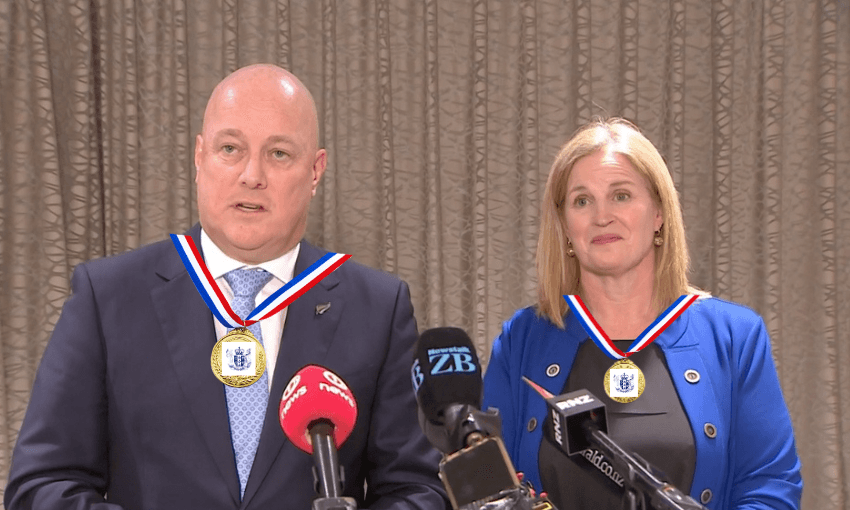What’s harder: training for the Olympics or surviving in Auckland on $307 a week?
For two weeks we’ve watched some of New Zealand’s best athletes compete on the biggest sporting stage for one of three medals. We’ve celebrated each medal win and expressed collective pride in the efforts of our fellow New Zealanders. And every single one of those athletes (with perhaps one or two exceptions) will have received consistent government benefit in the form of High Performance Sport NZ funding and grants. The very nature of our Olympic sports is beneficiary. And in the (sports) benefit Olympics we do pretty well. The hundreds of millions of dollars that we invest in various expensive sports like rowing, cycling and yachting result in a few shiny medals and bragging rights every four years if we’re lucky.
There’s an element of working for the benefit in this scheme, and athletes must meet their targets lest they have their benefits cut. Though most won’t ever win an Olympic medal, it’s still considered a worthy investment. It allows some people to live their lives doing what they love despite what they love not being a viable job without government funding.
But the fun benefit Olympics are over and now it’s time for the real benefit Olympics. The one where the ultimate prize is a little less shiny and a lot more demoralising.
On Monday afternoon, after congratulating our Olympic athletes and wishing them “a very well-deserved break”, prime minister Christopher Luxon and social development and employment minister Louise Upston announced the opposite of a break for beneficiaries in the form of a different type of medal system. Enter: the green, orange and red medals for those on the jobseeker benefit.
This new podium system will come into play in early 2025 and will require everyone on the jobseeker benefit to meet more requirements more regularly in order to continue receiving the not-even-close-to-minimum-wage benefit. It also includes some new sanctions for those who fail to perform as gold-standard beneficiaries.
If you are on the jobseeker benefit and do not complete a required activity (which could be applying for enough jobs, attending seminars or completing your jobseeker profile), you will drop in the rankings from green to orange. Once in the orange, you will have five days to contact MSD to give an acceptable reason or to complete the activity you missed. If you do not contact MSD within five days, or if you fail to give an acceptable reason for not completing the activity, you’ll drop to red and have a sanction issued.
New non-financial sanctions for those with dependents include having half of your benefit put on a payment card that can only be used for specific items like clothing and food for at least four weeks; and having to complete community service for a designated number of hours and weeks.
Once you’ve had a sanction, you’ll have that sanction logged against you for 24 months (it was previously 12), impacting future benefit needs and increasing the likelihood of having your benefit cancelled entirely after 12 months.
Luxon and Upston stressed that “the vast majority” of those on the jobseeker benefit wouldn’t require sanctions, so they shouldn’t be concerned. Outside of the concern of getting by in a cost of living crisis on very little money, of course. If you are on the jobseeker benefit and you train hard enough you could win a shiny green medal, which comes with a whopping government investment of $307.87 a week for those without children or a partner.
Upston suggested the “non-financial sanctions” (I’d argue monitoring the spending of 50% of the benefit is pretty financial) for parents was still better than simply reducing the benefit by 50%. “We are saying you get the same amount of benefit, just less freedoms,” said Upston, speaking about people who are not inside the criminal justice system but simply don’t have jobs right now.
Some might say it takes a lot of hard work to win an Olympic gold medal. I’d argue it’s even harder to live in New Zealand off $307.87 a week in a cost of living crisis and with record unemployment, even without the stress of sanctions if you don’t meet the MSD requirements consistently. One might break your body but the other will break your soul (and probably your body too actually).
So what about those who fall to the red zone and get sanctioned, then continue to fail to meet requirements? Very quickly, the benefit will be cancelled. The coalition government wants the numbers of people on the benefit to be reduced, and this system is in service of that goal. In fact, 1,500 people have already had their benefit fully cancelled in the past quarter, because not everyone can win in the benefit Olympics.
When asked what has happened to those people, Upston said she didn’t know. I think we can all guess.





